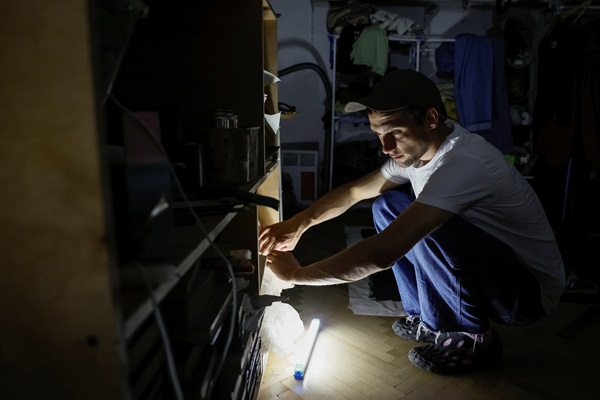 Ukrainian artist Yevhen Klymenko, a 29-year-old, works in his apartment during a blackout, amid Russia's attack on Ukraine, in Kyiv, Ukraine, 5 June 2024;
Credit: Reuters/Alina Smutko
Ukrainian artist Yevhen Klymenko, a 29-year-old, works in his apartment during a blackout, amid Russia's attack on Ukraine, in Kyiv, Ukraine, 5 June 2024;
Credit: Reuters/Alina Smutko
KYIV (Reuters) - When the power goes down and the elevator stops working, Ukrainian couple Maryna and Valeriy Tkalich leave the pushchair on the ground floor and carry their two-month-old son up the twelve flights of stairs to their apartment instead.
And once authorities in Kyiv have notified residents of upcoming scheduled electricity outages, the Tkaliches rush to bathe little Marian and prepare food for the family before the lights go out and taps run dry.
Such disruptions are becoming increasingly common for the city's population of about three million people, after Russia began pummelling the country's energy system in late March 2024, cutting out half of its generating capacity.
In scenes reminiscent of the winter of 2023, streets are frequently plunged into darkness, the hum of private generators can be heard again across Kyiv streets and people carry flashlights to get around.
"The main challenge is the lack of water," said Valeriy Tkalich, 34, speaking to Reuters at his Kyiv home where water pumps cannot reach the higher floors without electricity.
"For cooking, we also had to adjust and purchase a small gas camping stove to heat stuff up," said the IT product manager. "With the baby, it seriously complicates our reality."
Many Ukrainians fear things will get worse as winter approaches, with Russian forces seizing the initiative on the battlefield and intensifying missile and drone attacks on thermal and hydropower stations.
Moscow says Ukraine's energy infrastructure is a legitimate military objective and denies targeting civilians. Thousands of Ukrainians have been killed in attacks on residential buildings, schools and hospitals since early 2022.
Marian spent his first nights at home sleeping in the apartment hallway instead of a bedroom, to reduce the risk of harm should the building be struck.
"Even the air strikes, which we have got used to and which present huge risks for the family - made worse by the presence of the baby - bother me less than the blackouts do," Tkalich said. "Blackouts are the worst."
Warnings about upcoming power cut set off a flurry of activity in the household: "You have to fill up the water bottles, wash the baby, and cook food."
He and his wife, who has a jewellery business, are planning for the fall and winter in case the power cuts continue, but they are also considering moving further to the west where disruptions from missile attacks are typically less frequent.
Long-term damage
Just as Russia has stepped up its assault on Ukraine's power-generating capacity, Kyiv has struggled to secure enough air defence systems from its Western allies to protect itself.
As the country eagerly pleaded for additional air defences and awaited delayed military aid from the United States, Russian drones and missiles caused over $1 billion worth of damage.
Ukrainian authorities say the spring attacks have taken out about half of the country's generation capacity - 9,000 out of 18,000 Mwh - and that they have caused long-term damage that may mean power cuts for years to come.
Some Kyiv residents went without power for more than five hours a day last week due to deficits in the energy system, the worst situation in the capital since last winter.
For artist Yevhen Klymenko, a friend of the Tkaliches who also lives in Kyiv, power outages have brought a change in the way he works.
The 29-year-old now wakes up at dawn to paint in natural light, ditching his nocturnal working hours now that disruptions are so frequent.
He recently returned to an unfinished portrait of Ukraine's popular former commander-in-chief Valeriy Zaluzhnyi, and hopes the proceeds from it will help raise funds to buy equipment to support the country's military.
On visits close to the front lines, Klymenko said he had met Ukrainians who lived in far worse conditions than him.
"You understand everything here is insignificant," he said. "[At the front], it is far more difficult. So you come back, see that there is no power, and you say 'screw it'."








